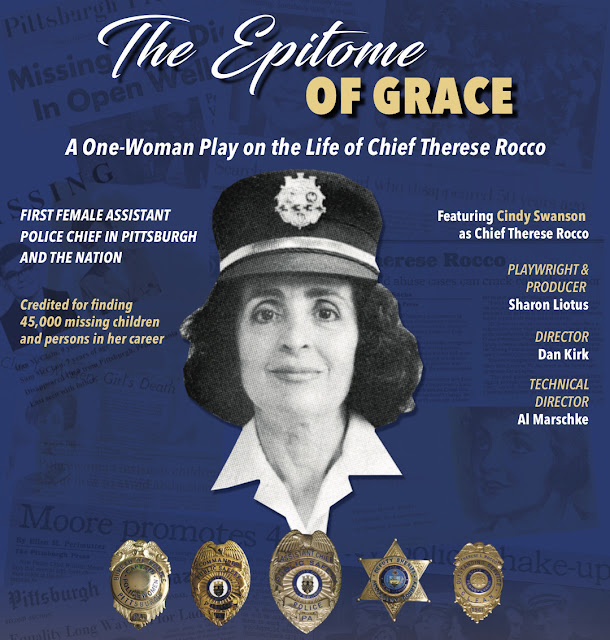This is unusual for me because I don’t normally review anything other than books on this blog. Still, here we are, and today I’m talking about “The Epitome of Grace,” a one-woman play featuring Cindy Swanson as Chief Therese Rocco. The playwright & producer is Sharon Liotus, who is a personal friend of mine—full disclosure—and it was directed by Dan Kirk, with Al Marschke as Technical Director.
As for why I’m reviewing a play out of the blue—there are many reasons—certainly, because I was asked to and because I went to see it for myself last Saturday, April 30.
Most of all, I agreed to do this review because I’ve met Chief Rocco, who is a real person by-the-by for you non-Pittsburgh natives. She’s an amazing woman. Therese Rocco started her career in law enforcement in the middle of the 20th century, and it stretched all the way to the new millennium. By the end of that illustrious career, she was Pittsburgh’s first female assistant chief of police—and the first in the nation, according to at least one local newspaper that I’ve not rigorously fact-checked on that point.
That, however, is straying from what I want to discuss.
I want to talk about what it was like to experience this play. As a one-woman show, it’s cleverly written from the perspective of and very much in the voice of Chief Rocco herself, telling us the story of her life. Liotus achieved this through her own friendship with Therese and through exhaustive interviews with those who knew and worked with the Chief.
At the performance I was at, Chief Rocco was in attendance. So it was a bit of a sight gag to see her in the crowd watching a woman on stage portraying a younger version of her. Like everyone else in attendance, Chief Rocco laughed when the play was funny. The vignette about how she caught the fleeing theater pervert by pulling down his pants as he tried to run away comes to mind, which has a certain amount of poetic irony about it when you think about it.
Alas, though, like with all true stories about police work, there are always the more sorrowful moments. It would be cliché if it weren’t so heartbreakingly true that every detective, given sufficient time on the job, inevitably has that one case that doesn’t get solved and haunts them—even long into retirement. The case of Mary Ann Verdecchia is that case for Chief Rocco, and the pathos that Swanson infuses into her performance describing that hole in time and space where Mary Ann disappeared walking home one day rends the soul. Mary Ann didn’t have a traditional family—her mother and father weren’t around, and she was being raised by a relative. The world took even more from her, and so far, the quest for justice has been left unfulfilled. Still, hope holds out that answers will be forthcoming one day.
Watching and experiencing—however vicariously and fleeting—Therese Rocco’s rise through the ranks in the police department is an absolute joy that this play captures. It was a journey with its ups, the promotions, and support—and downs, the constant roadblocks put in her path by those who had no motivation other than they didn’t like the idea of a woman being in her role. When Chief Rocco was tapped to be on the shortlist of candidates to be recruited for the U.S. Marshals and then ultimately betrayed for craven political reasons and blocked, again, because she was a woman, the indignity was palpable in the theater.
The concluding implicit message of the play, however, I think is its most powerful; that you can’t control the world and how it reacts to you, only how you respond to it in turn, and even if speaking for the truth is the losing position it’s still the correct one. There were many times throughout her long life and long career where Chief Rocco could have given up, thought of giving up, and had doubts—because that’s human.
In the end, though, what makes her legendary around here isn’t that she never had doubts or always succeeded. No, it’s that despite those doubts, she took what life threw at her on the chin and kept fighting for what was right, no matter how hard.
That’s grace.
This preview is an Amazon Affiliate link;
as an Amazon Associate, I earn from qualifying purchases.
Additionally, Chief Rocco also wrote her memoir "Therese Rocco: Pittsburgh's First Female Assistant Police Chief," which inspired the play. I plan to review it here on WIO at a later date when I finish reading the book. So far, I'm loving it as much as I enjoyed the play.


No comments:
Post a Comment